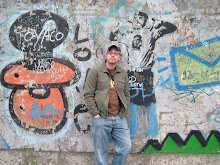 Invisible Cities by Italo Calvino
Invisible Cities by Italo CalvinoMy rating: 5 of 5 stars
Invisible Cities basically has everything I want from a postmodern novel. Its philosophical dream narrative is delightfully sophisticated, but lacks any pretension. Italo Calvino dismantles the 'real' world and notions of certainty and absolutism with great charm and sly precision. Calvino refrains from elevating himself over others, either through self-praise or by diminishing others. Through his whimsical descriptions of the fantastic cities populating the great Kahn's kingdom, Calvino acknowledges that the world is a big, complex place, where no two cities, cultures, or people are alike. Consequently, Marco Polo's examination and description of each city reveals that to require every city and people to follow the same system of imperfect rules, designed by people incapable of creating a perfect system, presents serious problems.
What most impresses me with Invisible Cities is how it pushes postmodernism without turning obnoxious, arrogant, lazy, mean, or stupid. Calvino's objective is not to destroy everything and declare there to be no god, no purpose, no center, and no reality. Instead, he seems to be amazed and delighted by the possibilities of a world unhinged from centralized, linear philosophy. He collapses time into one great now, wherein it becomes the individual's job to actualize their life and determine how they are to proceed. Truth becomes an elusive, tricky thing, but not absent from the world. If anything, Calivino seems to believe that our postmodern world creates more room for truth to exist, despite the bulk of mainstream thought (intellectual or otherwise) being saturated with over-determining half-truths and falsities. Finding personal truth becomes an obtainable challenge, where the first step is to recognize the limitations of our understanding, but to not then just throw in the towel and spout relativistic platitudes as over-determining as the allegedly irrelevant philosophies of past ages. To say nothing's real or true is just a lazy logical fallacy that Calvino avoids, which wins him big points with me. Instead, he writes one delightful piece of dream fantasy that is always smart and humorous, with a depth of feeling and compassion for humanity and the stumbling world we live in.
Lots of quotes I really like:
“The traveler roams all around and has nothing but doubts; he is unable to distinguish the features of the city, the features he keeps distinct in his mind also mingle.” (34)
“But why, then, does the city exist? What line separates the inside from the outside, the rumble of wheels from the howl of wolves?” (34)
“With cities, it is as with dreams: everything imaginable can be dreamed, but even the most unexpected dream is a rebus that conceals a desire or, its reverse, a fear. Cities, like dreams, are made of desires and fears, even if the thread of their discourse is secret, their rules are absurd, their perspectives deceitful, and everything conceals something else.” (44)
“There is no language without deceit.” (48)
“Polo: Perhaps all that is left of the world is a wasteland covered with rubbish heaps, and the hanging garden of the Great Khan’s palace. It is our eyelids that separate them, but we cannot know which is inside and which outside.” (104)
“Nobody wonders where, each day, they carry their load of refuse. Outside the city, surely; but each year the city expands, and street cleaners have to fall farther back. The bulk of the outflow increases and the piles rise higher, become stratified, extend over a wider perimeter.” (114-115)
“As the city is renewed each day, it preserves all of itself in its only definitive form: yesterday’s sweepings piled up on the sweepings of the day before yesterday and of all its days and years and decades.” (115)
“For those who pass it without entering, the city is one thing; it is another for those who are trapped by it and never leave.” (125)
“I speak and speak, but the listener retains only the words he is expecting.” (135)
“The inferno of the living is not something that will be; but if there is one, it is what is already here, the inferno where we live every day, that we form by being together. There are two ways to escape suffering it. The first is easy for many: accept the inferno and become such a part of it that you can no longer see it. The second is risky and demands constant vigilance and apprehension: seek and learn to recognize who and what, in the midst of the inferno, are not inferno, then make them endure, give them space.” (165)

No comments:
Post a Comment